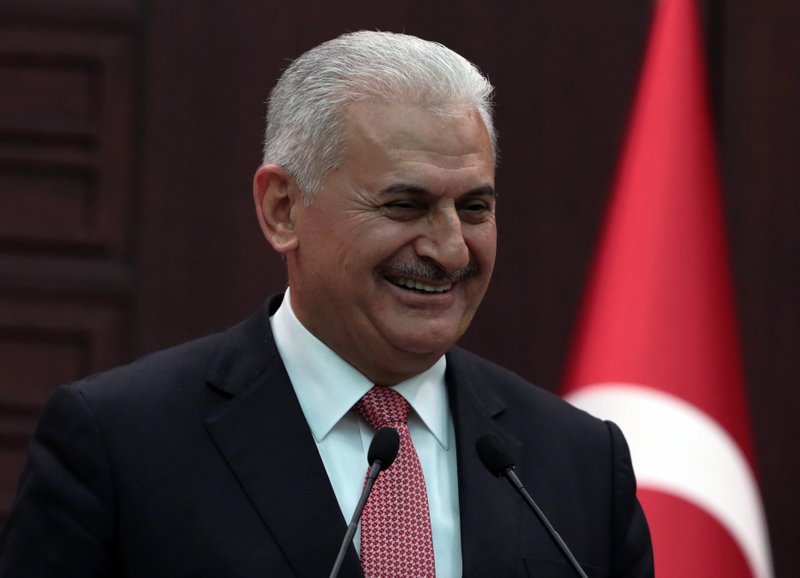JERUSALEM -- Israel and Turkey struck a broad reconciliation pact Monday that will restore full diplomatic relations after six years of animosity between the once-close Mideast powers.
The deal gave a boost to the leaders of the two countries, both of whom have seen their international standing deteriorate in recent months. But differences remain over a root cause of the rift -- Israel's blockade of the Hamas-ruled Gaza Strip -- and there's no indication the two countries will restore their once-close security ties.
Turkey also took steps toward improving strained ties with Moscow on Monday by expressing regret for downing a Russian plane near the border with Syria last year.
The agreement with Israel will include an exchange of ambassadors and Israeli compensation for the deaths of 10 Turkish citizens from a 2010 Israeli naval raid on an activist flotilla that aimed to breach the Gaza blockade. Turkey also will be allowed to carry relief supplies into Gaza and take on new development projects there.
"The world is convulsing. The Middle East is convulsing. My policy is to create centers of stability in this unstable and stormy region," Israeli Prime Minister Benjamin Netanyahu said as he announced details of the deal during an official visit to Rome.
"With this deal, the process of returning ties to normal has begun," Turkish Prime Minister Binali Yildirim said in Ankara.
Relations between Israel and Turkey began to decline soon after President Recep Tayyip Erdogan, whose party has Islamist roots, became prime minister in 2003.
Since then, Erdogan, who became president two years ago, has sought closer ties with Muslim nations in the region while trying to distance his country from Israel. Erdogan's close ties with Hamas, an Islamic Palestinian militant group sworn to Israel's destruction, further strained ties.
Relations took a sharp turn downward during Israel's three-week war against Hamas in Gaza in 2008 and 2009, when Erdogan criticized Israel over the Palestinian death toll.
Israel said the operation was needed to halt Hamas rocket fire and that the civilian death toll -- about 457 killed, along with an estimated 709 Hamas operatives -- was caused by Hamas using residential areas for cover.
The animosity peaked May 31, 2010, when Israeli commandos stormed a ship called the Mavi Marmara while stopping the international flotilla.
Nine Turks, including a dual U.S. citizen, were killed, and dozens of activists were wounded, one of whom died several years later. On the Israeli side, seven soldiers were wounded by activists who attacked them with clubs, knives and pipes.
After the operation, Turkey withdrew its ambassador to Israel and scaled back military and economic ties. Relations were never broken completely.
Israel later apologized for the deaths of the activists and agreed to compensate the victims' families under a U.S.-brokered arrangement in 2013. But the deal was never implemented as Turkey demanded the lifting of the Gaza blockade.
Israel says the blockade, imposed after Hamas seized power in Gaza in 2007, is needed to prevent the group from importing weapons. Critics say the measure, which has taken a toll on Gaza's economy, is collective punishment.
Under Monday's deal, Israel will pay $20 million in compensation for families of victims of the naval raid. In return, Turkey agreed to halt any legal claims connected to the raid. The countries are expected to exchange ambassadors within weeks.
In addition, Israel agreed to allow Turkey to deliver aid to Gaza through the Israeli port of Ashdod, where all deliveries will undergo security checks before entering the territory.
Yildirim said the first ship, carrying more than 10,000 tons of aid, will depart for Israel on Friday. He said Turkey would immediately start working on electricity, water and housing projects in Gaza, and complete a 200-bed hospital there.
"Therefore the embargo there is being lifted under Turkey's leadership," he said.
Netanyahu welcomed efforts to help solve Gaza's water and power shortages, but said the blockade remains a "top security interest." Yildirim did not comment on Israeli claims that Turkey agreed to prevent Hamas from fundraising or military activities on its soil.
Hamas had no immediate reaction to the deal. The Foundation for Human Rights and Freedoms and Humanitarian Relief, the Turkish Islamic charity group that helped organize the 2010 flotilla, criticized the deal, saying it amounted to acceptance of the Israeli blockade.
U.S. Secretary of State John Kerry, who met Netanyahu earlier Monday in Rome, called the Turkey deal a "positive step."
Information for this article was contributed by Bradley Klapper of The Associated Press.
A Section on 06/28/2016
